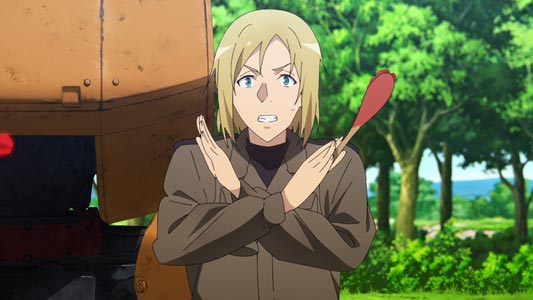As JP has increased in views and approaches the 7 million total-views milestone, I’ve become even more aware of how what I write can influence people. Of course, JP doesn’t have the reach of various other blogs, websites, and YouTube channels. However, whenever your make anything public, you expose yourself to a variety of personalities. The majority of people are cool, but the few trolls can cause problems. I’ve been fortunate so far: trolls have been rare.
However, I still censor myself sometimes for several reasons:
I self-censor because otherwise I would defeat my goal.
My goal for JP is to help you think differently about your anime fandom, about your interest in Japan, and about your life. People close their minds to your message if you challenge their thinking too much. If you preach, people walk away, especially online. I’ve been known to fall into preaching or lecturing in person, particularly when its a topic I’m passionate about. I’ve galloped over people when they bring up something about Christian history. For example, I ran over a person with the historical fact that Christians weren’t as persecuted by the Roman Empire as tradition teaches. Sure, there were periods, such as under Nero. However, collections of letters from governors to the Emperor suggest governors had to deal with “suicide by cop” (my words) with early Christians who wanted to be martyred. Persecution was limited to certain period and regions instead of being widespread as my fellow Christians like to believe. When Christians attained political power after Constantine, they persecuted their pagan neighbors more than their pagan neighbors had them. But stating this didn’t help me reach out to the people I spoke with. It challenged too much of their beliefs.
Sometimes self-censorship helps your message. It helps people listen and consider your message. My goal is to plant seeds, not transplant trees. Bludgeoning people with information, even when you are passionate, can close minds. The best way to challenge someone’s thinking is to plant a seed, not to try to jam a tree into their mind.
I self-censor because I’m a people pleaser and peacemaker.
I’m a people pleaser and a peacemaker by nature. I view conflict and competition as immature and primitive. I seek to find common ground. When I worked as a manager, I often dealt with conflict of various levels, from violence to hurt feelings. Frankly, it was exhausting. Writing is my way to escape from such immaturity. Yes, I know conflict isn’t necessarily immature, but that is how I view such things. Immature minds are impulsive and uncontrolled and emotional. As you can guess, I censor that view. In fact, this is the first time I’ve written this in public! I please people because I want them to listen and change.
Let me illustrate how I use this. When I first took my librarian position, we had a difficult patron staff avoided. He was loud and combative–an immature mind. I began to work with him, forgiving fines and otherwise making “favors.” I was accused of letting myself be walked upon; however, my actions were calculated. Hard enforcement of the rules was one of the catalysts for patron conflicts. Over time, I started enforcing some late fines and rules with the problem patron, but by then I had a rapport. It took nearly 2 years, but now this patron became much more pleasant and the staff didn’t mind working with him. He stopped returning items late, and when he did he had fine money ready. He remained a jagged personality, but he wasn’t barbed anymore.
While this was manipulative, I was planting seeds that eventually sprouted. Being a people pleaser and self-censoring your irritation and true thoughts is often seen as a sign of weakness, of being a doormat, in American society. If done right, being a people pleaser can be a strength. It can lead to true change. But you will receive flak for it, and change, when it does happen, can take a long, long time. Yet, what is the hurry?
I self-censor because the thoughts aren’t developed.
Everyone is entitled to their opinion. However, once that opinion is expressed, whether in writing or in speech, that opinion is now subject to challenge. Many times, I’ve had to bite my tongue to keep from expressing a half-baked, passionate opinion or thought. The thought wasn’t ready to be expressed because it lacked basis in facts and reason. I hadn’t considered it long enough or read enough about it. Articles on JP go through a long process of reading, thinking, researching, and then reconsidering before you see them. Even more off-the-cuff articles like this one simmer in the back of my mind for several days or weeks before I draft them. Then they simmer longer in the draft folder and go through revisions before I publish.
Not every opinion needs to be expressed. Although I fail in this principle, most opinions shouldn’t be expressed. Once it is public, you can’t withdraw it. Certainly, you can change your mind. However, many people will latch onto your first expressed opinion, especially as your platform enlarges. I am mindful of this because, while I can’t help such thinking, such thinking can hurt my ability to plants seeds in those readers. Likewise, I want to be a person who reasons. To be such a person, I need to, well, reason. That means the majority of my opinions remain in my mind or, when they nag, in my private notebooks. Few of my opinions reach the level of reason needed for me to express them. Of course, I often impulsively spout them anyway. It is a problem I continually work on.
Self-censorship isn’t always negative.
Usually, we deem self-censorship as a problem. China and other authoritarian governments create an environment where self-censorship is a matter of personal safety. Freedom of speech doesn’t mean all opinions should be expressed. A Japanese proverb comes to mind: “A loud cat doesn’t catch mice.” Self-censorship when your thoughts aren’t fully reasoned or when your emotions are high signals wisdom. Failure to self-censor can work against your goals, such as my goals for JP. Once an opinion is expressed, it is subject to analysis. Despite the current social climate, opinions aren’t sacrosanct once expressed.
You have the right to your opinion, but I also have the right to refute it when it contradicts facts. And facts are not opinions. Facts can be proven incorrect, but no one can have a different set of facts. Gravity is a fact. People use “different facts” so their opinions don’t have to be challenged, so they don’t have to self-censor. This isn’t reason or wisdom. It is foolishness. It is better to self-censor such opinions until they’ve been reasoned through, until they’ve been grounded in facts.
Self-censorship has a place in writing and in your interactions with people. Self-censorship is needed in social media. If you must express an opinion, write it in a private journal until it has time to come together and until you have time to verify it. It doesn’t matter if the opinion is about an anime character or a Bible verse. All opinions need due diligence before being expressed.







I’ve been reading your blog for years and like it very much! And I agree that self-censorship can be both positive and negative depending on circumstances.
With that in mind, I have a problem with your blog that you sometimes engage with outright trolls (even their names usually reveal that) who are just here to spew obscenities, and leave their comments to fester, so to speak. Several of your great articles leave a sour taste, at least for me, when the comments contain just such a troll. I really like your articles, but I just can’t advise people (thankfully, there’s very few people who would take advice from me) to casually read your blog because of this.
Whenever I encounter such troll comments, I debate about deleting them. And I have deleted far more troll comments than what I allow to remain. They remain rare against the majority of comments. I’m naive sometimes. I hope by engaging I might be able to plant a seed in readers who have similar trolling tendencies. I hope these seeds which will grow and change their thinking.
Thank you for reading! And while I am sadden to know that my, admittedly, futile seed planting keeps you from recommending my writing, I have a lifelong habit of jousting against windmills.